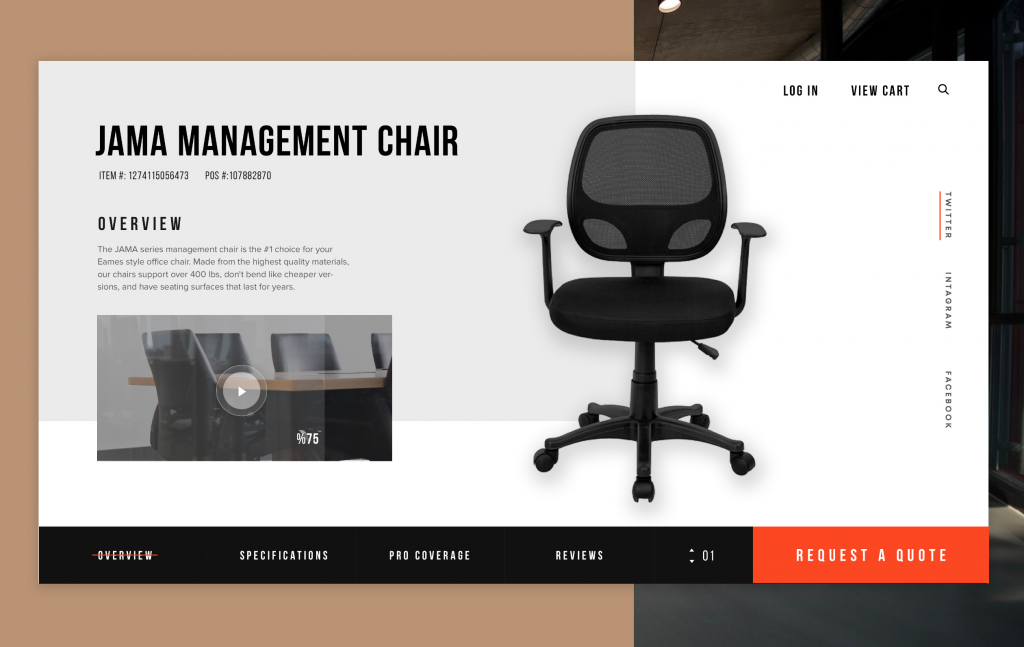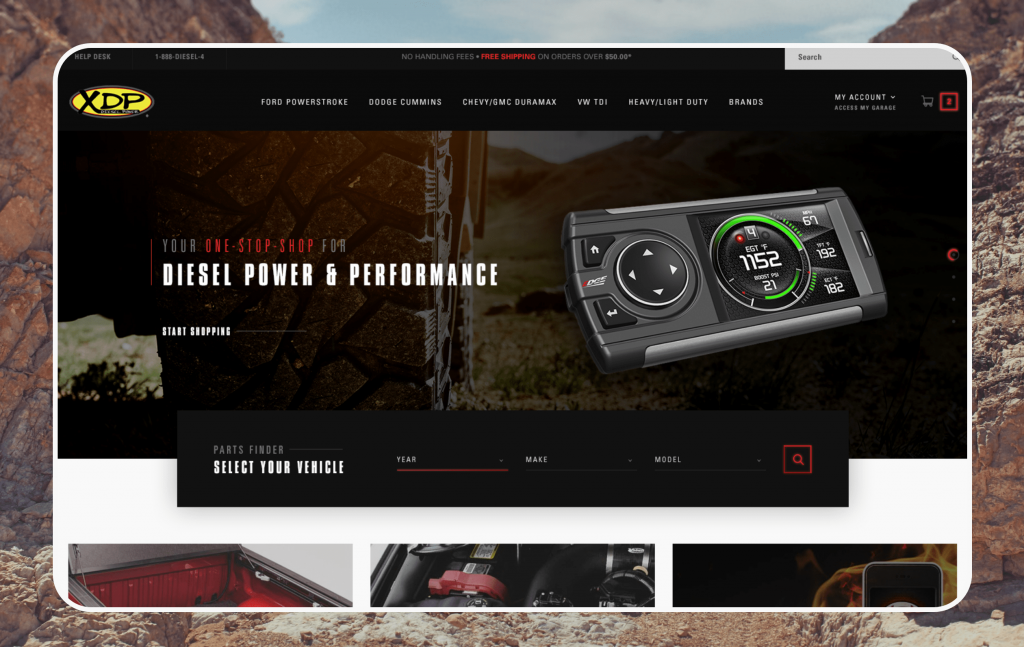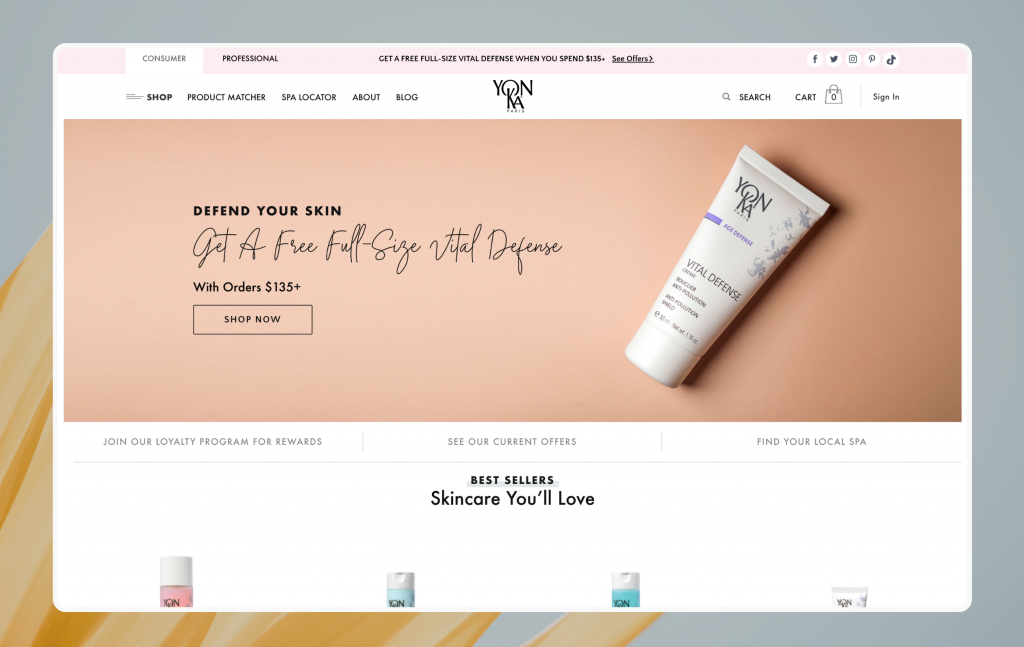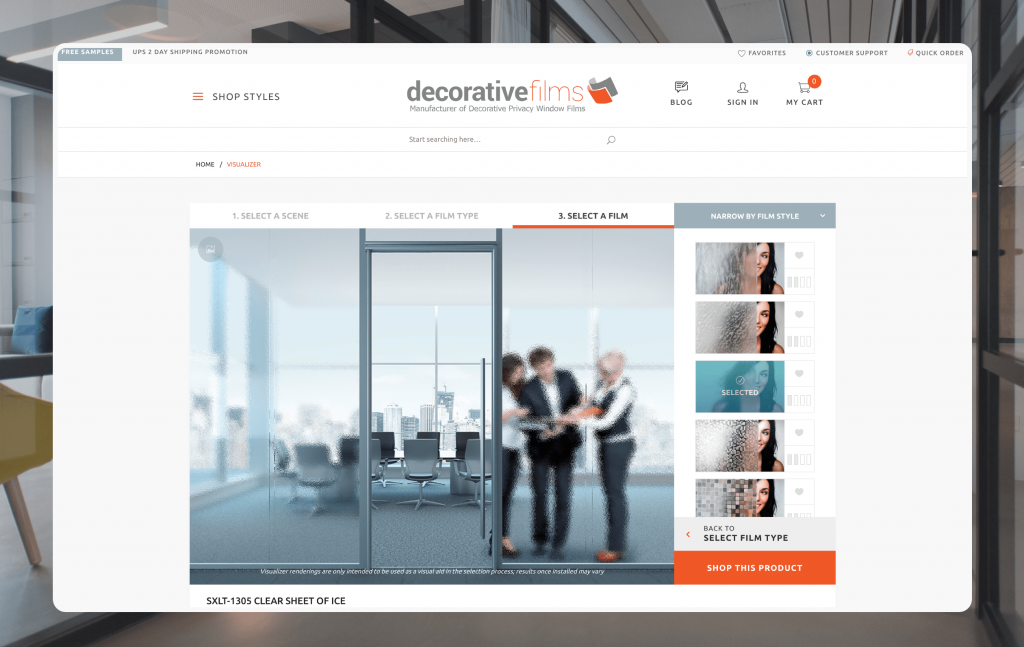
See why top ecommerce brands use Miva’s no-code platform to run
multiple stores, manage massive catalogs, and grow their revenue.
Table of Contents:
Business buyers are taking more of their purchases online than ever before, with a recent report showing that 75 percent of all business-to-business (B2B) product purchases are made online. Online B2B sales in the US are projected to reach $1.8 trillion by 2023, and will even surpass business-to-consumer (B2C) sales.
Today’s buyers also expect more from the buying process. We are seeing a paradigm shift in the B2B selling model where traditional buying cycles and in-person interactions with sales reps are being replaced by the convenience, personalization, and efficiency of ecommerce websites. The disruption caused by efforts to slow the spread of COVID-19 has also pushed B2B companies to digitalize their business to better reach their customers and remain competitive in an unpredictable market.
In this article, we discuss what modern B2B ecommerce entails, what’s important in a digitalized business buying experience, and how to succeed in the dynamic modern business landscape.
B2B ecommerce describes online transactions between two businesses, where one company sells its products or services to another company. Today’s business buyers, motivated by a desire for convenience and efficiency, increasingly want the option to buy online. The shift in buying practices is prompting offline sellers to transition to ecommerce, introducing more efficiency, flexibility, and growth potential to their business.
The B2B buying process is often much longer than its B2C counterpart and involves multiple decision-makers who are guided by research, logic, budget, and the interests of other stakeholders. Rather than making one-off purchases, business buyers are looking to form longer-term relationships with other businesses. They make educated decisions before purchasing a product or service and usually order large quantities.
The right ecommerce business model for your B2B company will depend on the products or services you sell, your business type, your industry, and your long-term growth plans. To better understand how B2B operates, let’s compare it to other popular ecommerce business models—models that are often combined with the business-to-business model.
Business-to-Business (B2B)
B2B refers to online commerce between two businesses. For example, one company sells auto parts to another business that then uses those materials to manufacture a car. Ecommerce allows these orders to be completed easily and securely online. An extension of the B2B model is B2B2B, which involves more than two businesses exchanging goods.
Business-to-Consumer (B2C)
This is the most familiar form of ecommerce. B2C describes a business selling a product or service directly to the end user. The B2C company either manufacturers its own products or secures products through a manufacturer. Some companies also operate on a B2B2C model, where they either work with other businesses to sell products to the end-user or sell through their own B2B and B2C channels.
Direct-to-Consumer (DTC)
In this model, a product manufacturer removes the third-party middleman, selling and marketing their finished goods directly to consumers. Many legacy B2B sellers are incorporating DTC to expand their reach, gain larger market share, and increase their customer loyalty.

B2B ecommerce can take many forms. What’s common between all B2B businesses is that their transactions are moving to the digital space and their websites are serving as the key facilitator in streamlining processes and providing a strong online experience to customers. Here are some of the most common types of B2Bs:
Wholesaler: A wholesale business is one that offers products in bulk to other retailers, sellers, and businesses. With wholesale ecommerce, businesses are leveraging digital commerce features to combine their sales, marketing, and distribution.
Manufacturers: Manufacturers use raw materials, parts, technology, and labor to produce their own finished goods. They then sell these goods to other wholesalers or manufacturers.
Distributors: A distributor works with a manufacturer to sell more products and actively bring visibility to these products, similar to the work of a sales rep. They often look for retailers to resell the manufacturer’s products.
Multichannel: A multichannel business is one that leverages B2B, B2C, and other marketplaces. Taking out the middleman, a multichannel business often sells their product to the end user by either partnering with a wholesale partner or selling directly to the customer through their website. These businesses often leverage a digital platform to deliver a stellar B2B and B2C ecommerce experience.

These terms are often used interchangeably, but there is a subtle distinction. Wholesalers conduct B2B transactions because they sell products to other businesses, but not all B2B sellers are wholesalers.
Today’s buyers want a digitalized buying process that offers convenience and accessibility. Rather than interacting with sales reps and manually placing orders offline, they prefer the self-service experience of online shopping. B2B businesses are rising up to meet these demands by leveraging online technology and marketing to reach buyers, drive sales, and provide a fluid experience. Here are some emerging B2B ecommerce trends:
Mobile Growth
Business buyers expect a mobile-optimized experience when they shop. Eighty percent of buyers use their mobile devices at various points of the buying cycle to look for new products, conduct research, purchase in bulk, and share information. To stay competitive, B2Bs need to make sure their stores are up to the task of mobile business shopping.
Efficient Fulfillment
B2B buyers expect a fast fulfillment experience on par with B2C shopping. Businesses will want to consider automating their order management and distribution processes. This can help speed up lead time, reduce manual labor, cut costs, and allow them to provide better customer service.
Personalization
Business buyers don’t want a generic purchasing experience. They expect special pricing and tailored recommendations that match their order histories and buying preferences. Because B2B purchasing decisions are often influenced by other stakeholders, the buying cycle is longer and more segmented. Personalization is a powerful tactic to cater to buyer needs, increase conversions on your B2B store, and build long-term relationships.
Loyalty and Referrals
Acquiring new customers is costlier than retaining an existing one. Loyalty programs are popular in B2C ecommerce but are also perfectly suited to B2B’s longer sales cycle, higher order values, and repeat business. In addition to increasing customer loyalty, businesses will also want to tap into the networks of their loyal customer base. Many B2B companies find success in encouraging referrals from their existing buyers and expanding their audience.
Immersive Experiences
Innovation is key to standing out in the B2B market. Buyers want to see more than just images and descriptions. New technology like augmented reality, virtual reality, and artificial intelligence are starting to transform the B2B shopping experience. Companies are leveraging 360° views, product visualizers, and intelligent search tools to provide highly detailed product information and allow buyers to virtually try out and buy complex products with ease.
As B2B sales continue to grow, ecommerce can offer many opportunities. Selling online enables businesses to leverage a digital platform and online marketing tactics to expand their audience and drive sales like never before. As B2B buyers skew younger, selling B2B online can help provide these buyers the experience they’ve come to expect.
The digital technology that comes with ecommerce also makes selling easier. Online transactions free up the time spent on time order taking and manually entering data, allowing businesses to better manage sales, open news channels, provide customer service, and pursue more high-value leads. This leads to improved operations, lower costs, and ultimately greater revenue.
Online shopping makes things easier for the buyers as well. According to Gartner, 77 percent of B2B buyers state that their latest purchase was complex or difficult. A clean, optimized online experience makes it easier for the B2B buyer to consolidate their information, make decisions, and make purchases.
By digitalizing your buying process, you lay the groundwork for scaling and future-proofing your business. Putting all your operations on one integrated platform allows you to seize new opportunities and create a business that can stand the test of time.
A robust B2B ecommerce platform enables you to personalize the buyer experience, speed up processes, and increase revenue for your business. Here are some areas to optimize in your B2B ecommerce solution and the features to include to stand out online and improve customer satisfaction:
For many B2B businesses, a turnkey ecommerce solution won’t cut it. Be sure to prioritize your needs and your buyer needs and choose a B2B platform that allows you to sell, manage, and showcase complicated products online. If you’re looking to sell B2B and B2C, look for a platform that will allow you to sell both on a single domain and create personalized browsing experiences for each customer group.
In selecting an ecommerce platform, many B2B decision-makers see return-on-investment (ROI) as the single most important factor. While the revenue and cost numbers can provide a good estimate, there are other more important factors in determining your ROI and selecting the best B2B ecommerce platform for your business.
Now that you’re familiar with what is needed to create a competitive B2B website, let’s take a look at some specific options for B2B ecommerce platforms.
Shopify Plus
Shopify Plus offers some important functionality beyond the basic Shopify ecommerce platform. Shopify Plus, however, is still built for smaller business with less complex business needs. Out-of-the-box B2B functionality on Shopify Plus is limited by your plan type, requiring you to rely on plugins, expensive third-party apps, and developers for more sophisticated functionality.
Handshake
Handshake was a B2B ecommerce platform for wholesaler websites. After its acquisition by Shopify in 2019, Handshake was rebranded as a B2B marketplace. While marketplace solutions like Handshake can open up new sales opportunities for wholesalers and can be a great part of a larger ecommerce strategy, they cannot replace having your own branded ecommerce website.
BigCommerce
BigCommerce is a SaaS platform that achieves some advanced functionality through third-party plugins and integrations. This means the platform’s built-in B2B features are limited and access to advanced B2B sales tools requires additional solutions. Site personalization and catalog modification features are also limited in functionality, which could hold your business back when it comes time to grow and scale.
Miva
Miva is a flexible and scalable platform that is designed to handle the scope and complexity of online wholesale catalogs. With Miva’s native support for B2B sales, you can deliver a modern online experience with unlimited product variations, multiple buyer accounts, flexible pricing options, and all-in-one B2B and B2C commerce. Miva’s SaaS-hosted system also offers easy upgrades, fast page load speeds, built-in PCI compliance assistance, and 24/7/365 in-house tech support.
Magento
Magento is an open source platform that offers extensive customization but requires significant development and ongoing maintenance. Magento updates have also known to break stores and require lots of patching. This results in less security, agility, and peace of mind for wholesalers in the long run.
Salesforce Commerce Cloud
Formerly known as Demandware, Salesforce Commerce Cloud unifies CRM, marketing, customer service, and ecommerce capabilities for Salesforce users. Although it’s often considered by large enterprise businesses, Salesforce Commerce Cloud can be costly and difficult to manage for many online wholesalers, leading to a much higher total cost of ownership overall. 
You can find online B2B stores in just about any industry, from automotive parts and beauty products to medical devices and hobby supplies. B2B ecommerce websites are increasingly looking like B2C sites in terms of their user experience, merchandising, and streamlined path to purchase. However, they stand out with more advanced features to manage their complex sales cycles and products and provide more clarity for their buyers.
An ecommerce website can serve as a powerful B2B marketing and sales engine for any business. According to Episerver, 82 percent of B2B teams say that their website is an indispensable asset to their business. Here are some examples of B2B companies who are successfully using their websites to sell their products and engage buyers.
Xtreme Diesel Performance
A retailer and distributor of quality diesel products, Xtreme Diesel Performance is a great example of a company that combines B2B and B2C channels into one intuitive and engaging shopping experience.

Further reading: Learn more about how Xtreme Diesel Performance uses their platform to drive repeat customers back to their site.
Yon-Ka Paris
Yon-Ka Paris is a luxury skincare company established in 1954. Their website combines elegant design and effective B2B merchandising, giving both their consumers and resellers a delightful shopping experience that reflects their product promise.

Yon-Ka Paris won the award for Best Website: Enterprise Class at the 2020 Blades Ecommerce Awards.
Decorative Films, LLC
Decorative Films, a market-leading manufacturer of professional grade window treatments, has a vast sales, distribution, and installation network. They created a comprehensive ecommerce website that leverages innovative product visualizers to provide a top-notch omnichannel shopping experience for their customers.

Further reading: Learn more about how Decorative Films, LLC leverages cutting-edge UI to serve customers across every channel.
Ecommerce marketing is central to growing your audience, driving sales, and creating lasting relationships with buyers that grow and sustain your business.
Marketing for B2B involves leveraging online channels and targeting clear buyer personas. You’ll want to prioritize strategies to better promote and explain your products or services. Since you are selling to other businesses who then distribute or manufacture your products, make sure to provide them with thorough information. Create a powerful marketing engine that promotes helpful content (i.e. size charts, lists, guides, whitepapers and email newsletters), capitalizes on referrals and testimonials to build social proof, and leverages paid advertising to reach new buyers and address their challenges and pain points.
In short, successful B2B marketing means providing buyers with the information they need when they need it and engaging them online with an accessible website experience. If you’re able to do that, buyers are more likely to trust your expertise, choose you as their preferred business, and give you their loyalty—factors that will allow you to thrive in the years to come.

As more buyers turn to ecommerce for their purchasing needs, you need to have more than just a bare-bones website. Take advantage of opportunities to scale your business and leverage modern ecommerce capabilities to get more shoppers through the door. Doing so will enable you to build a resilient business that drives profit, satisfies buyers, and supports your overall growth and revenue goals.

Love it? Share it!
Back to top
No worries, download the PDF version now and enjoy your reading later...
Download PDF Miva
Miva
Miva offers a flexible and adaptable ecommerce platform that evolves with businesses and allows them to drive sales, maximize average order value, cut overhead costs, and increase revenue. Miva has been helping businesses realize their ecommerce potential for over 20 years and empowering retail, wholesale, and direct-to-consumer sellers across all industries to transform their business through ecommerce.
Visit Website